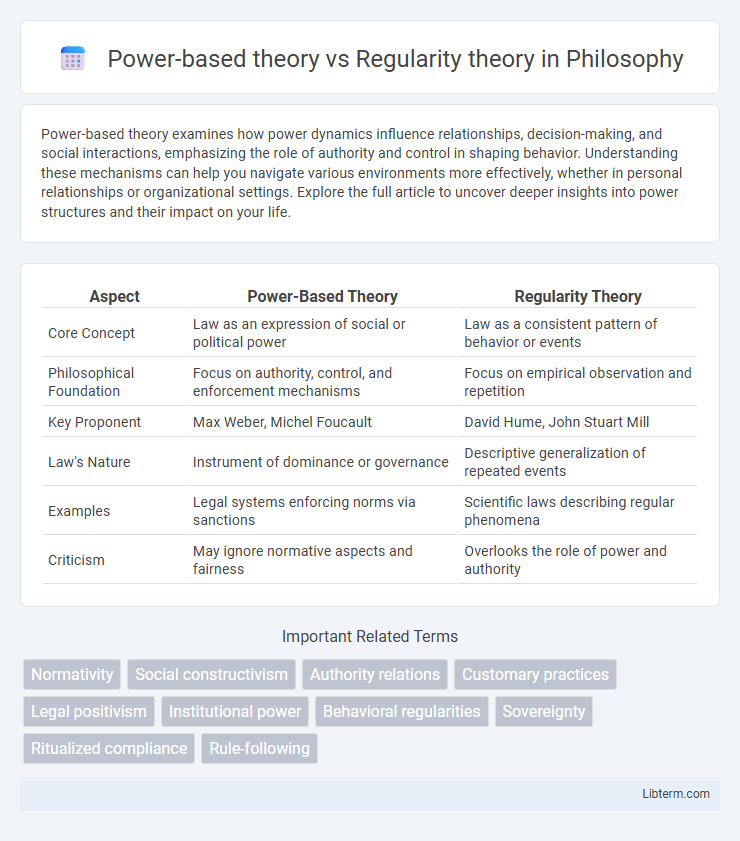Power-based theory examines how power dynamics influence relationships, decision-making, and social interactions, emphasizing the role of authority and control in shaping behavior. Understanding these mechanisms can help you navigate various environments more effectively, whether in personal relationships or organizational settings. Explore the full article to uncover deeper insights into power structures and their impact on your life.
Table of Comparison
| Aspect | Power-Based Theory | Regularity Theory |
|---|---|---|
| Core Concept | Law as an expression of social or political power | Law as a consistent pattern of behavior or events |
| Philosophical Foundation | Focus on authority, control, and enforcement mechanisms | Focus on empirical observation and repetition |
| Key Proponent | Max Weber, Michel Foucault | David Hume, John Stuart Mill |
| Law's Nature | Instrument of dominance or governance | Descriptive generalization of repeated events |
| Examples | Legal systems enforcing norms via sanctions | Scientific laws describing regular phenomena |
| Criticism | May ignore normative aspects and fairness | Overlooks the role of power and authority |
Introduction to Causation Theories
Power-based theory of causation emphasizes the inherent capabilities or powers entities possess to bring about effects, highlighting causal efficacy rooted in natural dispositions. Regularity theory defines causation through consistent, invariant patterns of event sequences, where cause and effect correlate via repeated observations. Both theories address the fundamental question of how causes produce effects but diverge in focusing on underlying powers versus observed regularities as the basis of causal relations.
Defining Power-Based Theory
Power-Based Theory defines the nature of laws as grounded in the inherent powers and dispositions of entities rather than mere patterns of events. It asserts that laws arise from the causal capacities within objects that produce consistent behaviors under specific conditions. This approach contrasts with Regularity Theory, which explains laws solely as descriptions of observable regularities without reference to underlying causal mechanisms.
Understanding Regularity Theory
Regularity theory defines causation through constant conjunction, where cause and effect consistently co-occur, emphasizing observable patterns rather than underlying mechanisms. It focuses on the regular succession of events, asserting that causation is nothing more than the regularity of one event following another. This theory contrasts with power-based theory by rejecting the notion of inherent causal powers or forces behind events.
Historical Origins and Key Proponents
Power-based theory, rooted in the works of Michel Foucault and Max Weber, emphasizes the role of power dynamics and authority relations in shaping social norms and behaviors. In contrast, Regularity theory, stemming from David Hume and John Stuart Mill, focuses on the consistent patterns and regular associations observed in nature or human conduct as the basis of causal inference. These foundational perspectives illustrate divergent approaches to understanding causality, with power-based theory highlighting social influence mechanisms while Regularity theory centers on empirical regularities.
Core Principles of Power-Based Theory
Power-Based Theory centers on the concept that rule obedience stems from an authority's ability to exert power and impose sanctions, emphasizing coercion and control as fundamental mechanisms. It posits that compliance is driven by the risk of punishment rather than intrinsic adherence to normative regularities. This contrasts with Regularity Theory, which views laws as descriptions of consistent natural patterns without necessarily invoking authoritative power or enforcement.
Core Principles of Regularity Theory
Regularity theory holds that laws of nature are descriptions of consistent patterns or regularities observed in the world, emphasizing the actual occurrences of events rather than underlying powers or causes. It asserts that laws do not govern phenomena but instead summarize the constant conjunction between antecedent and consequent events. This approach contrasts with power-based theories by rejecting the existence of inherent causal powers, instead relying on empirical observation of stable, repeatable relations.
Main Differences Between the Theories
Power-based theory emphasizes the role of social power dynamics and authority in shaping norms and laws, highlighting how dominant groups enforce compliance to maintain control. Regularity theory focuses on the predictability and consistency of actions, defining laws as descriptions of observed regular patterns in behavior without requiring a moral or hierarchical basis. The main difference lies in power-based theory's emphasis on enforcement through authority versus regularity theory's reliance on empirical observation of habitual conduct.
Strengths and Criticisms of Power-Based Theory
Power-Based Theory excels in explaining social dynamics by emphasizing the role of power relations and agency in shaping norms, highlighting how dominant groups enforce and sustain social order. Its strength lies in addressing inequality and conflict, offering insights into how power asymmetries influence behavior and institutional structures. Criticisms focus on its potential neglect of routine patterns and stability, with some arguing it underestimates the role of regularity and shared expectations in maintaining social cohesion.
Strengths and Criticisms of Regularity Theory
Regularity Theory's strength lies in its emphasis on observable patterns and consistent correlations, making it empirically accessible and straightforward for explaining causation. Critics argue that it struggles with distinguishing genuine causal relations from mere coincidences, failing to account for underlying mechanisms or counterfactual situations. This limitation leads to challenges in addressing causation in complex scientific contexts where regular patterns do not imply direct causality.
Practical Implications in Modern Philosophy
Power-based theory emphasizes the role of agents' abilities and capacities in explaining laws of nature, influencing practical approaches in ethics, law, and social sciences by focusing on empowerment and agency. Regularity theory, which views laws as consistent patterns or regularities in nature, provides a framework for scientific prediction and explanation, guiding empirical research methods and the development of technology. Modern philosophy applies these theories to debates on causation, scientific explanation, and normativity, affecting policy-making and interdisciplinary methodologies.
Power-based theory Infographic

 libterm.com
libterm.com